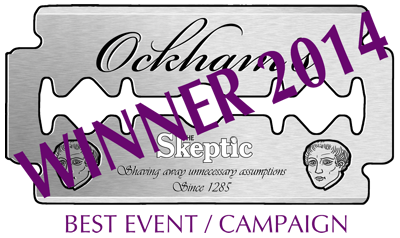NHS Homeopathy: 20 years of decline
Data published today by NHS Digital shows that homeopathy prescriptions in England fell by nearly a quarter in 2016
Continuing its inexorable two-decade decline from its peak in 1996, the number of prescriptions for homeopathy products supplied in community pharmacies in England fell by 23% in 2016.
Data released today by NHS Digital show that homeopathy prescriptions fell from 8,894 in 2015 to 6,821 last year, a drop of 96% since its peak in 1996:
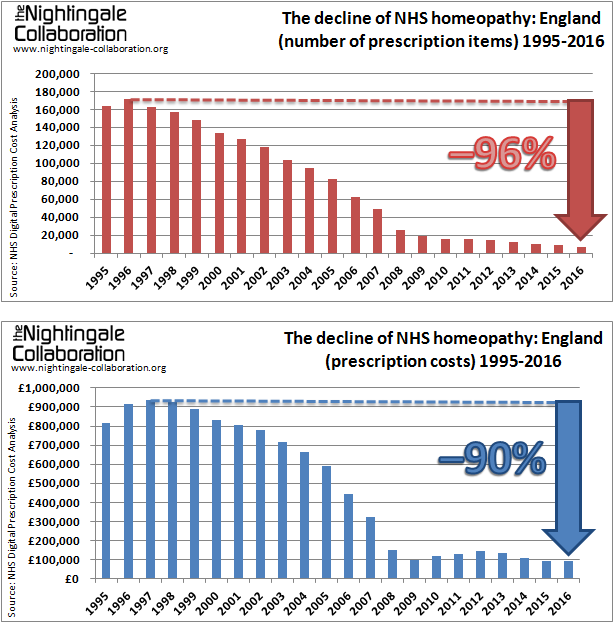
This drop is a welcome sign that the NHS continues to understand the need for robust evidence for treatments and that it does not exist for homeopathy. Although the mantra of choice is frequently repeated by supporters of homeopathy, providing a treatment for which there is no good evidence of specific patient benefit does not provide a choice to patients: they deserve better.
The House of Commons Science and Technology Select Committee in its Evidence Check on homeopathy concluded:
157. By providing homeopathy on the NHS and allowing MHRA licensing of products which subsequently appear on pharmacy shelves, the Government runs the risk of endorsing homeopathy as an efficacious system of medicine. To maintain patient trust, choice and safety, the Government should not endorse the use of placebo treatments, including homeopathy. Homeopathy should not be funded on the NHS and the MHRA should stop licensing homeopathic products.
In the most comprehensive review to date of the evidence for homeopathy, the Australian National Health and Medical Research Council concluded:
Based on the assessment of the evidence of effectiveness of homeopathy, NHMRC concludes that there are no health conditions for which there is reliable evidence that homeopathy is effective. Homeopathy should not be used to treat health conditions that are chronic, serious, or could become serious. People who choose homeopathy may put their health at risk if they reject or delay treatments for which there is good evidence for safety and effectiveness. People who are considering whether to use homeopathy should first get advice from a registered health practitioner. Those who use homeopathy should tell their health practitioner and should keep taking any prescribed treatments.
With such damning conclusions, patient choice cannot be heralded as sacrosanct. Consumers are perfectly free to buy their own homeopathy products, but it behoves the NHS to provide treatments that are based on robust scientific evidence.
Rising costs
The drop in the number of prescriptions is not matched by a corresponding fall in the total cost of those prescriptions: the number fell by 23% but the overall cost of these prescriptions only fell by 2%. How can this be?
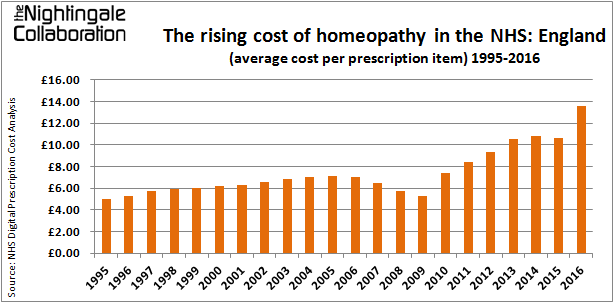
For some reason, the average cost for each homeopathy item jumped by 28% to £13.55 compared to the previous year's £10.60. This is a substantial rise and may have been due to a jump in the cost of raw sugar… or maybe the suppliers wanted to try to compensate for the decreased sales volume? Looking at what happened in 2010, there could be a pattern.
Scotland
The next release of data for Scotland will be in June and will cover prescriptions from 01 April 2016 to 31 March 2017. There's no reason to suppose a similar decline won't be seen there too, particularly given the closure of the final seven in-patient beds at the Glasgow Homeopathic Hospital tomorrow: the legitimacy given to homeopathy by the NHS is slowly but surely being removed.
Popularity
Proponents of homeopathy frequently state that it's used by 10% of the population. They usually don't cite any evidence to substantiate that figure, but it could come from the statement made by Prof Kent Woods — the then Chief Executive of the MHRA — when giving evidence to the Select Committee in 2009 (Q182, Ev 65):
From the point of view of evidence, certainly from a regulatory perspective, it is very important evidence that something like ten per cent of the population have used a homeopathic remedy or have gone to a homeopath in the previous 12 months, and that I think is a starting point for deciding what is the public health significance of this phenomenon.
He didn't provide a source for that figure and it's always been contentious. Now, however, we have a more up-to-date figure from the European Social Survey. In their 2014 survey, they asked questions about the use of a number of CAM practices (acupressure, acupuncture, Chinese medicine, chiropractics, herbal treatment, homeopathy, hypnotherapy, massage therapy, osteopathy, physiotherapy, reflexology and spiritual healing) in the previous 12 months in 21 countries. For homeopathy, they found that only 1.3% of people had used it:
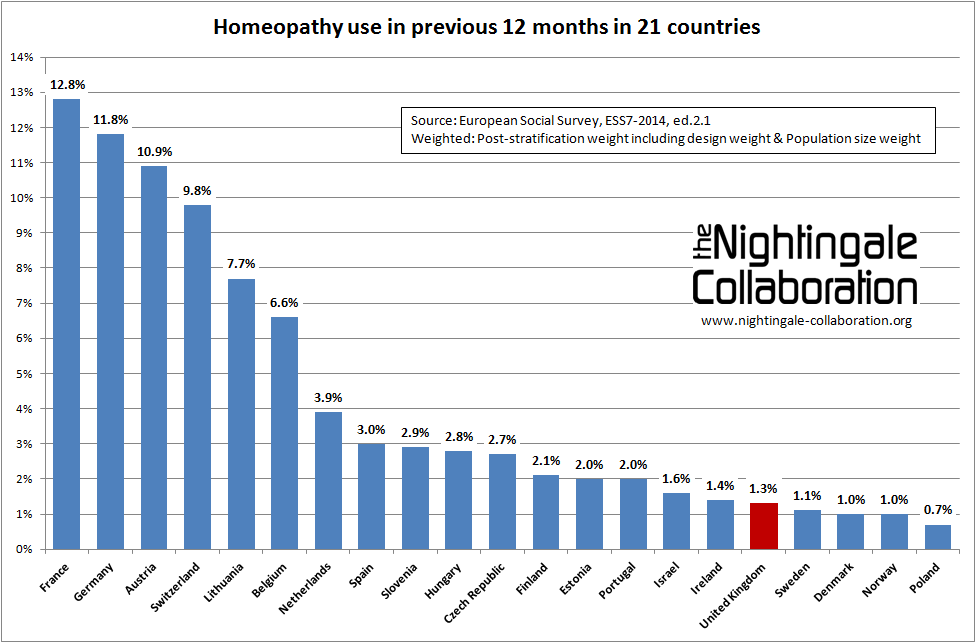
Ranking fifth, the UK compares very favourably with the other countries surveyed, and the usage is considerably less than previously claimed. It is also likely that even this is an over-estimate as the survey didn't provide any guidance to participants about what homeopathy was, so it's likely respondents may have included the use of all sorts of herbal or home remedies rather than just homeopathic products.
The same survey gives a picture of the usage of other practices in the UK:
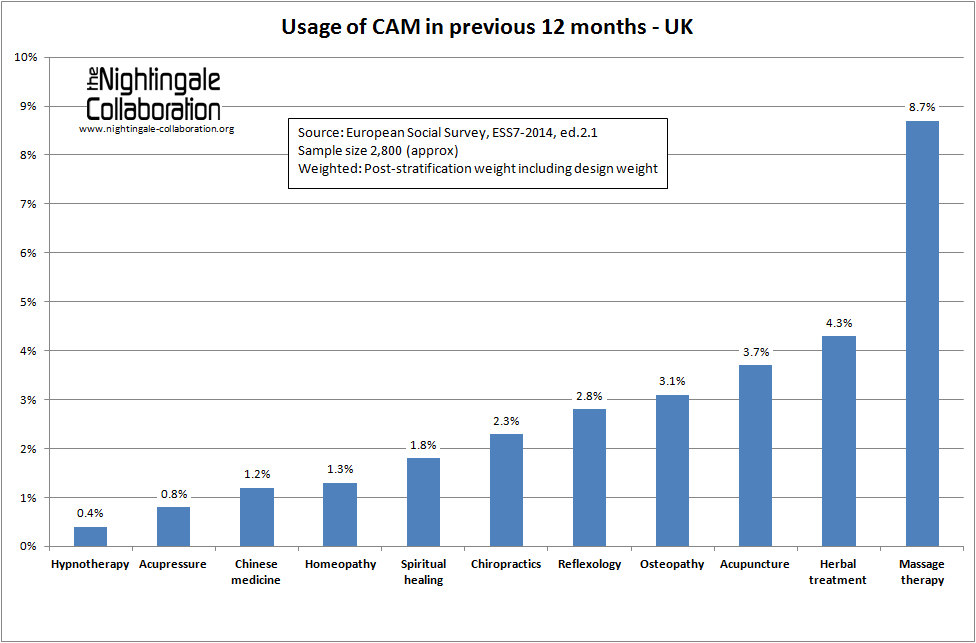
However, for homeopathy on the NHS, it's difficult not to come to the conclusion that it's dying.
30 March 2017
Latest news
- "Undisputable evidence of scientific misconduct" by homeopaths
- Yet another bad year for homeopathy
- Nelsons Homeopathic Pharmacy #3
- Nelsons Homeopathic Pharmacy #2
- The Society of Homeopaths: failing to make the case for homeopathy
- The end of homeopathy on the NHS in Bristol?
- NHS Homeopathy: 20 years of decline
- The different faces of the Society of Homeopaths
- The growing pains of osteopaths
- Diluting misleading claims - ASA update
Most read
- Finding deleted and changed webpages
- About The Nightingale Collaboration
- How to find out who owns a website
- Advertising Standards Authority
- Rubbing salts into the wounds of homeopathy
- How to submit a complaint to the ASA
- The decline of homeopathy on the NHS
- Landmark decisions for homeopaths
- NHS Lanarkshire to end referrals to Glasgow Homeopathic Hospital
- Making a complaint

